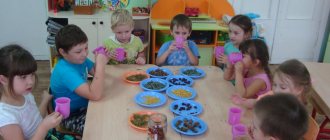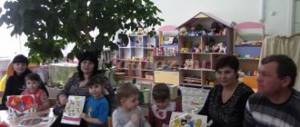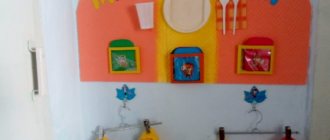Parent meeting in the form of a business game in the middle group of a preschool educational institution. Abstract
Parent meeting in the form of a business game “The role of the family in raising children “Where to look for kindness?””
Description of the material : I offer you a scenario for a parent meeting in the middle group in the form of a business game “The role of the family in raising children “Where to look for kindness?” This material will be useful for educators, preschool teachers, and students. The material is aimed at increasing professional knowledge on working with parents and the role of the family in raising children. Explanatory note Every person wants to have a family, every person wants close and loved ones to wait for him, support him in difficult times, understand him, and give him a sense of support. And if this is not the case, then the person becomes lonely, cut off from everything. The family contributes to the formation of the child’s personality; one of the functions of the family is education. The goal of the family is to educate and educate their children, to instill in them moral values, norms of behavior in society, and to adapt children to normal life. Mother and father are the main educators of their children. The decent behavior of adults in the family serves as an example to follow and develops in children such moral traits as kindness, responsiveness, and caring. Nowadays, it is often possible to observe a deficit of kindness, love, and compassion among children. The reason for this phenomenon is that parents spend more time working than raising their children. Therefore, it is very important to hold meetings with parents in the form of a business game “The role of the family in raising children “Where to look for kindness?” Games will help parents, for a moment they will find themselves in a world of kindness, love, care, affection, joy. Goal: to intensify the participation of parents in raising children in a spirit of responsibility. Bring to a correct understanding of your educational role in the family. Objectives: - to cultivate a feeling of love for your child; - develop the ability of parents to analyze their own educational activities and choose the right methods of influencing the child in accordance with his age and individual characteristics of upbringing; - increase responsibility for raising children; - develop friendly relationships between parents, parents and children; — establish partnerships between the teacher, children and parents; - provide an opportunity for parents to share their experiences in raising children; — show activity, attentiveness, sensitivity, ingenuity, and most importantly the desire to become the most active participant in the business game. Preliminary work: prepare one medium-sized ball, one inflatable yellow ball, sheets of paper in A-4 format, felt-tip pens, sheets of paper with life situations, sheets of paper with proverbs, tables, chairs.
Progress of the business game
(Greetings from the teacher to the participants in the business game)
1. Speech by the teacher on the topic “The role of the family in raising children” Currently, the topic of family in raising children is very relevant, since the family is the world where the foundations of morality and attitude towards people are laid. The family plays a great role in instilling in a child a culture of behavior, discipline, organization, honesty, truthfulness and modesty. The relationship between children and adults in the family should be trusting, friendly, but not equal. In the family, a child learns to express his opinion, has the right to argue, prove, and reason. The family should support any manifestation of creativity, initiative, and independence by the child. Whatever the child is, he needs recognition of his individuality and the support of loving parents. “Children are the mirror of the family” - this expression surprisingly accurately conveys the meaning of a child’s orientation towards the spiritual and moral values of his family. Therefore, loving and understanding adults should be around the child. Such close and intimate contact can only be achieved within a family. In those families where there is a close and warm relationship between mother and child, children grow up independent and active, and where there is no such contact, children are withdrawn and aggressive. Raising a child begins in the family, and the kind of relationship between parents that prevails there will determine how the child will grow up. Habits, tastes, preferences, preferences are deposited in the minds of children long before the process of realizing what is happening begins. After all, children’s behavior is modeled on the example of copying. It is the family that gives rise to a sense of continuity between generations, and through this, involvement in the history of one’s family, and the development of the ideals of patriotism. And when raising children, no other institution can replace the family; it plays the main role in the formation of the child’s personality. The foundations of a child’s personal qualities are laid in the family. For a child, the family is the environment in which the conditions for his physical, mental, emotional and intellectual development are formed. The family atmosphere influences the formation of the child’s mental makeup and determines the development of feelings and thinking. 2. Game “What kind of person would you like your child to be?” The purpose of the game:
to help parents express out loud their vision in their child: a harmonious combination of external, physical and internal spiritual virtues and achieve the desired vision without missing the germs of the most valuable character traits in the formation of the child’s personality.
Rules of the game: parents stand in a circle, the teacher passes the ball to the parent standing next to him and invites each parent to express his opinion on how he wants his child to be. The ball must reach each parent. At the end, the teacher summarizes everything that has been said. 3. Exchange of views on “Life situations” Goal: to help parents see the problems of adults in raising children and learn from the examples of others, avoid mistakes, and find the right path in different life situations. Parents sit on chairs in a circle. Under the chairs, the teacher places 3 pieces of paper under different chairs in advance. Situations 1, 2, 3 are written on the pieces of paper. Parents take turns reading situational moments, first they tell their point of view, how they would act in this situation, and then they all discuss this situation together and come to the correct opinion. At the end, the teacher summarizes what was said, adding that the children really want to see us always in a good mood. Our actions, deeds, and behaviors largely depend on us as adults, on our state of mind. You must be able to cope with moments of irritation and anger. Situation 1 “A parent is late for work and runs by the hand to lead the child to kindergarten. The child is capricious, almost crying, showing his displeasure. In the locker room, a parent begins to forcefully take off his clothes, the child cries and resists.” Situation 2 “Evening. A parent came to pick up a child from kindergarten. A child leaves the group with a smile and joy and begins to tell how interesting he spent today, read an interesting work, played, walked, drew. The child shows his drawing. The parent silently reacts to the child, not paying attention to the drawing.” Situation 3 “On a day off, the parents decided to take their child for a walk around the shopping center. There are a lot of interesting things around, a child’s eyes widen. The parents decided to look into the toy department. The child saw a bright, beautiful, large car and asked to buy it. Young parents' budget does not allow them to buy an expensive car. The child throws a tantrum, starts screaming, crying. People turn around, the child does not agree to any persuasion.” 4. Game “Add a word” Purpose of the game
: invite parents to finish the sentence by adding words - the child learns... (What to do?) Rule of the game: the teacher reads, and the parents select the words.
At the end, the teacher generalizes, concluding that parents should think about upbringing and how each child’s childhood goes; who leads the child by the hand determines what kind of person today’s child will become. - The child is constantly criticized - parents' answers (he learns to hate) - The child grows up in reproaches - parents' answers (he learns to be aggressive) - The child is constantly supported - parents' answers (he learns to value himself) - The child is constantly ridiculed - parents' answers (he becomes withdrawn ) 5. Reading proverbs “About goodness” The purpose of reading proverbs: to help parents at the right time “find the right words” for their child. Rules for reading proverbs: parents read proverbs about goodness, which are prepared in advance on pieces of paper by the teacher. At the end, the teacher generalizes that kindness is the ability to do something kind and good to other people. Children respond to everything good and beautiful. The task of adults is to help children become sensitive, generous, merciful and kind. You need to find words in time with which you can console the child and cheer him up in difficult times. - Good is good everywhere; - A kind word is half happiness; - They pay for good with good; - Life is given for good deeds; - A good person lives forever in goodness. 6. Game “Tender Word” Purpose of the game:
to develop friendly relations between parents.
To help parents see the basis of a good relationship, to more often use words of tenderness, love, care, respect, and kindness in their speech towards the child. Rules of the game: the participants of the game affectionately address the person standing next to them, give compliments, and smile at each other. In the end, the teacher summarizes that the affectionate, kind attitude of adults helps children learn the lessons of kindness and implant them in their souls for life. 7. Competition “My Mood” The purpose of the competition:
to help parents feel their mood and draw on a piece of paper.
Rules of the competition: on 3 tables, the teacher prepares in advance sheets of paper in A-4 format, felt-tip pens of different colors in sufficient quantities. Parents are invited to take part in the “My Mood” competition if they wish and draw their mood in emoticons. Without copying from each other. At the end, based on everyone’s completed drawings, parents guess what mood the contestants drew. 8. "Game with a ball." Purpose of the game
: to help parents feel the joy of the game, radiating kindness to everyone playing in the circle, like a smiling sun giving warmth to everyone. Rule of the game: parents, standing in a circle, play with an inflatable yellow ball, passing it to each other from above; each parent should try to keep the ball in the air for as long as possible. The teacher thanks all participants in the business game for their active participation and wishes them success in raising children.
We recommend watching:
Summary of the parent meeting for the middle group of the kindergarten at the beginning of the school year Non-traditional parent meeting in the middle group of the kindergarten Non-traditional parent meeting in the middle group Note of the final parent meeting in the kindergarten. Middle group
Similar articles:
Parent meeting in the middle group. Family traditions
Parent meeting in the middle group. Our grandparents in the family
Parent meeting in the middle group. Child's emotional well-being
Parent meeting in the middle group on the topic “Healthy lifestyle”
Parent meeting in the middle group. Reading fiction








